

Behind Prada's Astounding Results. MILAN, Italy — “I’ve got the brains and you’ve got the looks...”

So goes the Pet Shop Boys’ classic track ‘Opportunities (Let’s Make Lots of Money).’ In Prada’s case, it has both: smart management and desirable product, a combination that really is making the brand lots of money, evidenced by the company’s recent announcement that its net profit increased 46 percent in the 2012 financial year, while other international luxury brands like Hermès and LVMH are reporting slowing growth, citing a slowdown in China. What’s more, according to Mario Ortelli, an analyst at Sanford C. Bernstein, Prada’s momentum is set to continue on this trajectory for the next 2 to 3 years at least. It’s recipe for success? Not too Big, Not too Visible Part of Prada’s current advantage is that in key growth markets, like China, the brand isn’t yet too big or too visible — especially in comparison to some of its luxury peers.
Planned Retail Expansion and Margin Benefits. Prada Woos Young Chinese With Edgier Sister-Brand - China Real Time Report. Bloomberg News In China, Miu Miu is leading Prada’s growth and the brand accounts for 35% of net sales across Asia.
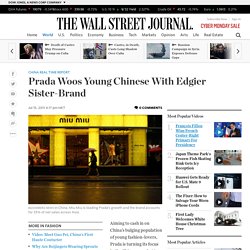
Aiming to cash in on China’s bulging population of young fashion-lovers, Prada is turning its focus in the Chinese market to its frillier, funkier sister-brand Miu Miu. The Italian fashion house, which raised 16.7 billion Hong Kong dollars (US$2.15 billion) from its initial public offering in late June, on Thursday hosted a dinner runway show in Shanghai, where a slew of European, Russian, and Chinese models showed off Miu Miu’s fall and winter 2011/2012 collection while Hong Kong stars, including actress Cecilia Cheung and pop singer Sammi Cheng, feasted on lobster tail. Why Chanel’s Price Cuts in China Could Boost Its Brand.
Chanel cuts prices in Asia to combat grey market. China’s luxury malls on weekday afternoons are usually long on bling and short on shoppers.
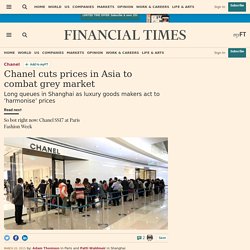
But at the Chanel store at Shanghai’s ultra-glitzy IFC mall, dozens of people queued on Friday for a rare opportunity to buy luxury items barely more expensive than they would be in Paris. Sample the FT’s top stories for a week You select the topic, we deliver the news. “I want to buy a handbag today,” said Heidi He, who made a special journey across Shanghai’s Huangpu river to visit the mall. Luxury Brands Get Tough With Counterfeiters - China Real Time Report. Luxury brands are getting more aggressive about taking suspected counterfeiters to court.
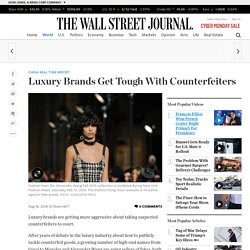
After years of debate in the luxury industry about how to publicly tackle counterfeit goods, a growing number of high-end names from Gucci to Moncler and Alexander Wang are suing sellers of fakes, both in China and the West. The legal action comes as brands grapple with an explosion of fake goods on e-commerce and social-media platforms.
Fashion brand Alexander Wang, which sued the owners of 459 websites believed to be selling counterfeit handbags, footwear and clothing last year, won a $90 million judgement this month in a New York district court. The court froze the websites and transferred their domain names — many of which are believed to originate in China — to the designer. Affordable luxury comes to the fore in China[1]- Chinadaily.com.cn. Just why are Louis Vuitton and other high-end retailers abandoning China? In the heart of Guangzhou’s Yuexiu district, the shopping centre La Perle is a symbol of luxury living in the southern Chinese city.
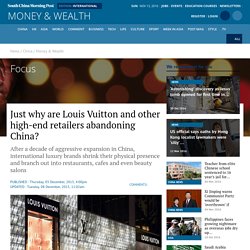
The high-end shopping mall, which opened in January 2004, has long been the first stop for many international brands seeking to conquer the Chinese market. But times are changing. A few weeks ago, La Perle lost one of its biggest tenants: Louis Vuitton. The French luxury retailer closed its store on the ground floor saying it would not renew its expired lease. This followed the shutting down of the two other LV stores in the northeastern city of Harbin, in Heilongjiang province, and the western city of Urumqi, the Xinjiang capital. The brand said the closures were part of a marketing strategy adjustment by headquarters. Singles Day: Alibaba breaks record sales total.
Media playback is unsupported on your device E-commerce giant Alibaba has beaten its sales record for its annual Singles Day event.
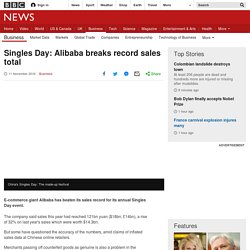
The company said sales this year had reached 121bn yuan ($18bn; £14bn), a rise of 32% on last year's sales which were worth $14.3bn. But some have questioned the accuracy of the numbers, amid claims of inflated sales data at Chinese online retailers. Merchants passing off counterfeit goods as genuine is also a problem in the industry. Burberry Opens Online Store on Alibaba's Tmall.
Coach Closes Handbag Shop on Alibaba’s TMall - China Real Time Report. BEIJING—Luxury handbag maker Coach Inc. has closed its flagship shop on Alibaba Group Holding’s business-to-consumer sales site, TMall.
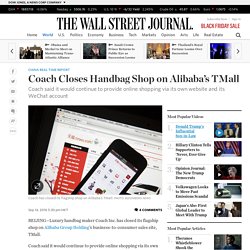
Coach said it would continue to provide online shopping via its own website and its WeChat account on the social-media app operated by Alibaba rival Tencent Holdings Ltd. Coach has offered coupons on WeChat and launched a media campaign on the app. A Coach spokeswoman declined to explain the reasons behind the decision, beyond saying it wanted to consolidate resources. She said the company would continue to look for innovative ways to leverage digital and social platforms to interact with customers. Alibaba said customers could still buy Coach products on TMall from other merchants. “This is a decision by Coach out of its own consideration to adjust its operational strategy,” Alibaba said. How to Fix Luxury’s Alibaba Problem. NEW YORK, United States — Over the last three months, Chinese consumers purchased 115,000 authentic Coach products worth $14 million on Taobao (Alibaba’s largest marketplace) and Jingdong (known as JD).
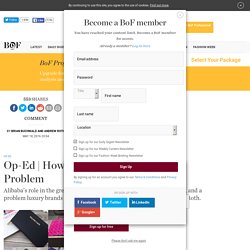
When annualised, this equates to 455,000 products and $56 million in revenue. An impressive accounting for Coach, for sure — except Coach didn’t actually sell any of the items, at least directly. Coach, like other brands that Bomoda analysed in the past six months, has a significant challenge in the form of Alibaba and, to a lesser extent, JD. But the fight these brands are currently waging and the bag of tricks they are leveraging won’t bring about a solution. This week, the International Anti-Counterfeiting Coalition (IACC) suspended Alibaba's membership. The position taken by IACC members is predicated on their disdain for the counterfeit market, in which hundreds of thousands of sellers leverage Alibaba’s scale to sell — and resell — goods. How does this happen?
Can China's middle class spend the world out of recession? Meet the Zhangs, one of China's new middle-class families who some economists believe are going to spend their way to a revival of the global economy.
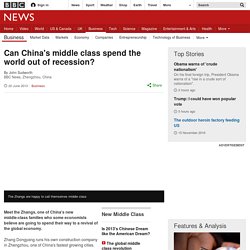
Zhang Dongyang runs his own construction company in Zhengzhou, one of China's fastest growing cities. His wife, Zhang Min, is a hospital administrator, and together they earn about $40,000 (£25,000) a year. They own their own apartment, mortgage free, drive a Japanese-made Lexus car and will, they say, soon start taking not one, but two holidays a year. Their six-year-old son, Zhang Zhiye, attends a private school. "Yes I do feel middle class," Mr Zhang tells me, adding that it's now become acceptable to admit it. "People who are more capable rise to the top.
Of course, the Zhangs aren't going to single-handedly rescue the world from economic misery. Burberry committed to Hong Kong despite sales slowdown. LONDON Falling sales in Burberry's (BRBY.L) Hong Kong market will not deter the British luxury brand from its commitment to one of its most profitable regions, it said on Wednesday.
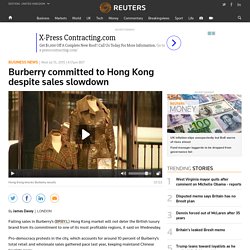
Pro-democracy protests in the city, which accounts for around 10 percent of Burberry's total retail and wholesale sales gathered pace last year, keeping mainland Chinese tourists away. The 159-year-old firm, famous for its British-made trench coats and cashmere scarves, said Hong Kong comparable store sales fell by a double-digit percentage in the three months to June 30, its fiscal first quarter. Shares in Burberry, already down 9 percent over the last three months after a cut in profit guidance in May, fell up to a further 3.7 percent, to be the top FTSE 100 faller, despite the group maintaining most of its guidance.
"We manage the business for the long term, always looking through that lens," Chief Financial Officer Carol Fairweather told reporters. China's anti-corruption campaign takes a bite out of growth - Jan. 28, 2014. The anti-corruption campaign has ensnared executives working for foreign and Chinese companies, and more than 37,000 government officials have been placed under investigation, according to state media. Employees at drug giant GlaxoSmithKline (GLAXF), dairy producer Danone (DANOY) and state-backed oil company PetroChina (PCCYF) have all been implicated. In addition, Beijing has put the kibosh on conspicuous spending. Government representatives have been told to stop holding extravagant banquets, riding in showy cars and giving or accepting luxury gifts. Flower arrangements and exotic Chinese dishes like shark fin have been banned from official functions.
Officials have even been ordered to stop holding lavish funerals. China's high-end catering industry sees negative growth - Business. GUIYANG - China's high-end catering and food industries were hit hard in 2013 amid the country's anti-corruption and austerity campaigns, statistics showed. Revenue of dining businesses with annual sales more than 2 million yuan reached 818.1 billion yuan ($131.6 billion), down 1.8 percent year on year, marking the first negative growth since China began to collect such data in 1991. Wang Yao, director of the All-China Commercial Information Center, said at a press conference on Wednesday that the growth rate was down 14.7 percentage points last year from 2012. Revenue of dining businesses with annual sales less than 2 million yuan increased by 15 percent last year compared with that in 2012.
Meanwhile, sales of luxury liquor and high-end health care products, also declined sharply last year, Wang said. China: Judges banned from extravagant spending. Judges may not buy fireworks, cakes or greeting cards with public money under austerity measures imposed by the Supreme People's Court in China, it's reported. The list of forbidden purchases is to prevent "extravagance and waste" during public holidays, the state-run China Daily newspaper reports.
Judges are also banned from spending state cash on entertainment, travel, treating guests and driving government cars on personal business, the ruling says. Making it clear that it's taking these austerity measures seriously, the Supreme People's Court says disobedient judges will be subject to "strict and heavy punishments". Austerity has emerged as official policy throughout China as President Xi Jinping aims to rein in the perceived extravagances of public servants.
In September, state-run China Central Television slashed the budget for its usually spectacular Mid-Autumn Festival gala programming, cancelling fireworks and pop stars in response to the new policy of frugality. China plenum: Looking for clues on China's economy. Image copyright AFP China's top Communist party officials are in Beijing for a four-day, behind-closed-doors meeting this week.
The plenum kicks off a big year for China, building up to next year's party congress, a twice-a-decade event. While this week's gathering is largely pre-scripted, a communiqué is usually released at the end of event - and that should help the outside world figure out which way China is headed. Political considerations - especially party leadership, succession issues and a "code of conduct" for party cadres - are likely to dominate proceedings.
The real costs of China's anti-corruption crackdown. Image copyright AP Much has been written about China's ongoing crackdown on corruption, but now one of the world's biggest banks has put a price on it. According to a report published by Bank of America Merrill Lynch this week, the Chinese government's anti-graft campaign could cost the economy more than $100bn this year alone. That's a lot of economic activity, something not far off the total size of the economy of Bangladesh, which supports some 150 million people (although admittedly not very well). Macro effects Many of the micro effects of Xi Jingping's anti-corruption drive have already been well documented of course; a slowdown in the restaurant trade for example, and a big dip in sales of luxury goods. China's corruption drive. Corruption up among China government officials. How serious is China on corruption? Even among China's jaded internet users, this was big news: Li Jianguo, a Communist official operating at the very top of the party, was under investigation for corruption.
Mr Li, who serves as vice chairman of China's parliament, reportedly engineered the promotion of his nephew to a plum government position. Anti-gifting Policy in China: How are Luxury. Gift-Giving Crackdown Hits China Luxury Retailers. Forbes Welcome. Why China Needs to Kick the Luxury Habit. This transcript has been automatically generated and may not be 100% accurate. China steps up anti-corruption measures - CCTV News - CCTV.com English. Luxury goods market in mainland China to expand more than 25 percent in 2011. Study Finds Rapid Growth In 2010 And The First Nine Months Of 2011, With Gradual Softening In The Fourth Quarter Shanghai, December 15, 2011—Sales of luxury goods in mainland China will grow overall by 25 to 30 percent in 2011, with more than 60 percent of purchases coming from new luxury customers; this according to findings from a new study ("2011 China Luxury Market Study") presented today at a press conference by Bain & Company, the leading advisor to the global luxury goods industry.
How heritage drives success of Chinese luxury brands. Chinese consumers are quickly becoming the world's largest group of buyers of luxury goods, snatching up products across all segments of luxury, both at home and overseas. Eighty per cent of the growth in luxury goods sales since the 2008 financial crisis has come from Chinese consumption. Autos - Meet China's most expensive car. Bloomberg is reporting that a Chinese customer in Nanjing has bought the very first production Honqui L5 saloon, China's most expensive car.
Mr Wang Zhonghua is the man with the cash, and will take delivery of his new ‘Red Flag' L5 some three months from now, following its unveil at this year's Beijing motor show. We saw the L7 last year too at the Shanghai Motor Show, and this one looks equally like a European luxury car that crashed headfirst into the 1960s. Attitudes toward domestic and foreign luxury brand apparel: A comparison between status and non status seeking teenagers. How heritage drives success of Chinese luxury brands. 你可能不知道的中国奢侈品牌. 中国的奢侈品牌何在?_财经_腾讯网. 转播到腾讯微博. Subscribe to read. Bain: In 2016, Chinese Luxury Consumption Fails to Grow for First Time in History. China’s E-Commerce: The New Branding Game - Bain Report. Just why are Louis Vuitton and other high-end retailers abandoning China? Why Chanel’s Price Cuts in China Could Boost Its Brand.
When luxury brands go digital in China... 为什么国外二线品牌进入中国摇身变成奢侈品?_深窗网. Spring Luxury Update 2016 - Press Release. Bain & Company’s 2014 annual global luxury study proclaims the rise of the consumer as luxury markets settle in for lower, but more sustainable long-term growth. China luxury market study 2015 - press release. China Luxury Report 2016. 2011 China Luxury Market Study. Luxury Goods China Market Study 2012. Keep luxury goods consumers from shopping abroad. Chinese shoppers world's top luxury goods spenders, while China luxury market cools to seven percent growth in 2012. 英媒:中国奢侈品店全球第一 中国人仍去外国买_新闻_腾讯网. Luxury fever in China. Luxury fashion brand consumers in China: Perceived value, fashion lifestyle, and willingness to pay. Traditional luxury markets benefit as China slows.
Understanding luxury consumption in China: Consumer perceptions of best-known brands. Potential niche markets for luxury fashion goods in China. Luxury Goods Have Lost Their Shine. In Stagnant Market, Luggage Brands Roll On. Top 10 Risks for the Luxury Industry. Keeping Pace With China's 'Post-Crackdown' Luxury Landscape. To Have and Have Not: Inequality Hits Luxury. 5 Stereotypes About Chinese Luxury Consumers Debunked. China's New Reality, Shrinking Luxury Retail, Guo Pei. Casual Style Contributing to China’s Luxury Fatigue. Homegrown Labels, Valentino Cuts Prices, Macau's Luxury Shoppers. Can Luxury Brands Weather the China Storm? BoF Professional, This Week in Fashion. Weak Prada Sales, Still Leading Luxury, Asos Exit. Resetting China’s Luxury Compass. Intelligence, Market Pulse. Luxury Brands Online in China, Shoppable Video.
Luxury retailer LVMH sees revenues rise. Luxury brands Hermes and Burberry beat expectations. Asian shoppers thirst for luxury. The designer creating a new Chinese brand. Can Chinese fashion designers go global? The Chinese brands of tomorrow. Chinese luxury labels to challenge Western counterparts. Can Huawei become China's first global brand? The Brazilian selling Chinese phones to Latin America. Viewpoint: Why do so few Chinese brands go global? Burberry warns of 'challenging' year in luxury market. China Anti-Corruption Drive Hits Luxury Brands and Landlords. Anti-extravagance meets luxury brands in China.
QianWen 20150403. Beijing's anti-corruption drive hits China's luxury market. Tough times for luxury retail in China. Chinese anti-corruption campaign nearly destroyed corporate catering. 当奢侈品遭遇反腐 - 时事 - 时代周报. 英媒:中国反腐重创外国奢侈品业 专卖店渐关门. 奢侈品在中国走上绝路? 反腐成奢侈品噩梦:贪官称西装全部过万_财经_腾讯网. 估值蒸发76亿美元 奢侈品大牌经受中国反腐之痛 -华尔街见闻. 中国奢侈品遭遇寒冬 或因反腐和经济放缓. 中国奢侈品市场风光不再. 中国反腐,奢侈品躺枪. 香港不再是“中国大卖场” Is Time Running Out for Luxury in China? How China’s Anti-Corruption Campaign Is Putting Pressure On A Slowing Economy. Chinese anti-corruption campaign nearly destroyed corporate catering. The Worst May Be Over for Luxury Goods in China. China's Anti-Corruption Campaign is Masking the Real Causes of the Luxury Slowdown.